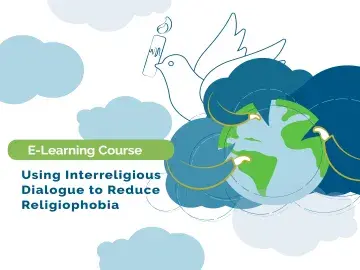Using Interreligious Dialogue to Reduce Religiophobia
In order for people from different cultures, religions and nations to live together in peaceful coexistence, it is important to establish a set of common, basic values. These unifying values are becoming particularly important in today’s globalised world.
But, is it possible to establish a shared ethical framework for all religious traditions? This module aims to answer that question through analysis of the Global Ethic and the basis of common ethical principles.
Participants will learn to place global ethics into the context of dialogue, resulting in increased efficiency in peacebuilding and greater cooperation between religions. The course will also explore the role of identities in a globalized world, the formation of prejudices and stereotypes, diversity and exclusion technologies and dialogue as a tool for recognition.
- The role of identities in a globalized world
- The formation of prejudices and stereotypes
- Diversity and exclusion technologies
- Dialogue as a tool for recognition
This interactive digital course is specifically designed for busy professionals who do not have time to take the longer, moderated eight-module course on 'Using Interreligious Dialogue to Strengthen Peace, Reconciliation and Social Cohesion'. They can now select the relevant thematic topics and modules and learn on the go. Administered through a Massive Open Online Course (MOOC) platform, this short course takes around three hours to complete, and, using a phone or a computer, can be taken anywhere, anytime, and at a suitable pace.
This course is specifically designed for today's global leaders, including policymakers, UN agencies and religious leaders and institutions.
Modern and updated browsers.
The practice of using interreligious dialogue (IRD) for building social cohesion, peace and reconciliation is rapidly emerging as a necessary tool for the twenty-first century toolbox. KAICIID e-learning courses build the capacities of global leaders to address a number of today's most pressing challenges by using IRD to establish ethical policymaking frameworks, support peace processes, and address discrimination and religiophobia at national and local levels. The courses are part of an ongoing collaboration with renowned universities such as The Universite de Montreal, the Complutense University of Madrid, and the Institut Superior de Ciencies Religioses de Barcelona.
E-Learning in IRD designed for the general public


